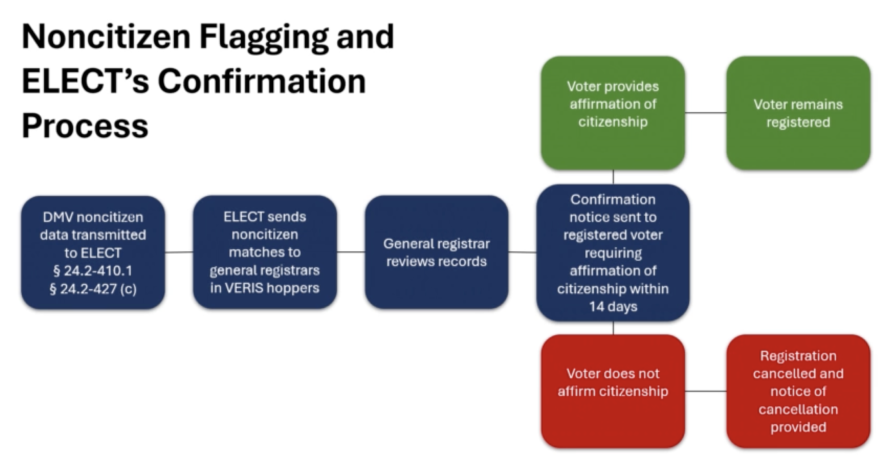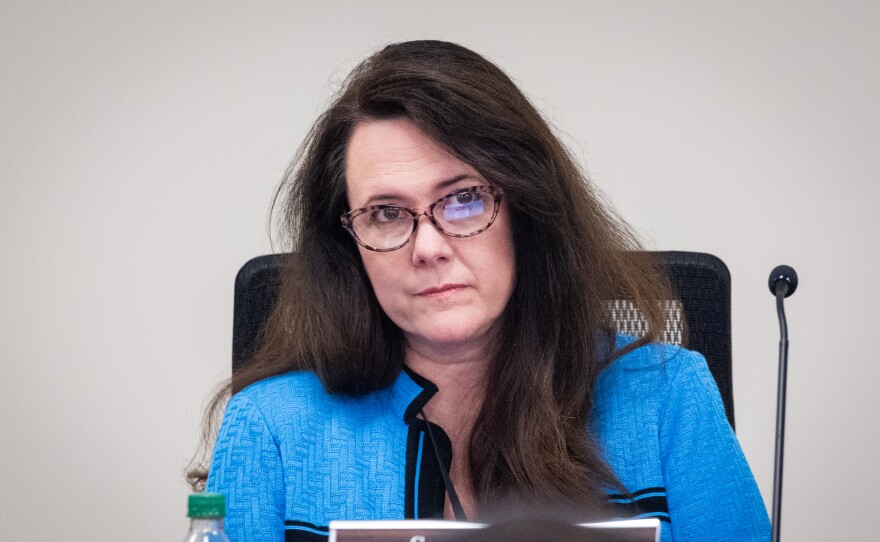For the second consecutive year, questions are being raised over Virginia’s voter rolls.
Friday, the U.S. Department of Justice sued Virginia and Susan Beals in her capacity as the state’s election commissioner. The department’s lawyers said daily removals of people ineligible to vote, like noncitizens and people convicted of felonies, come too close to the Nov. 5 election and violate federal law. The National Voter Registration Act says states cannot remove voters systematically in the 90 days before the election.
The DOJ filed a similar lawsuit in Alabama in September.
The removals in question are related to an executive order filed Aug. 7 — 90 days before the election — by Gov. Glenn Youngkin that directs Beals to certify that noncitizens are removed from voter rolls on a daily basis, among other measures, to ensure the accuracy of voter lists.
Last year, thousands of Virginia voters who had previously been convicted of a felony and had their rights restored were removed from the rolls. At the time, ACLU of Virginia policy strategist Shawn Weneta called the situation “unprecedented and unconstitutional.” The governor called for the Virginia Office of the Inspector General to investigate.
Virginia in 2023 also withdrew from the Electronic Registration Information Center, a multistate bipartisan program aimed at maintaining accurate voter registration records.
Speaker of the House Mike Johnson responded to the DOJ lawsuit, alleging that the administration of President Joe Biden and Vice President Kamala Harris wants noncitizens to vote.
Republicans, including former President Donald Trump, have raised the specter of noncitizen voting as the party aims to retake the White House and the U.S. Senate.
Johnson was reiterating ideas from a post on Youngkin’s personal social media account, which also called the lawsuit unprecedented. The post was the account’s most shared tweet ever.

Del. Cia Price, the chair of the House of Delegates’ Privileges and Elections Committee, told VPM News Monday she saw politics in the responses — and in the executive order itself.
“In my words, the executive order was playing into political rhetoric and demonizing undocumented residents who are not doing anything wrong,” she said.
“I think what voters can take away is that xenophobic rhetoric is dangerous, there is not rampant voter fraud in the Commonwealth of Virginia, and that they should check their voter status to make sure that no errors occurred within their own name being on the voter registration list,” she said.
U.S. Rep. Gerry Connolly said he notified DOJ of the issue last week after writing to Youngkin about it on Oct. 7 — the same day the Virginia Coalition for Immigrant Rights and League of Women Voters of Virginia filed their own federal suit against Beals and other state officials over the voter removals.
Connolly said in a statement that the National Voter Registration Act “requires states to refrain from systematically purging voter rolls within 90 days of an election. It brings with it the potential to unduly disenfranchise legitimate voters and is causing unnecessary confusion across Virginia.”
A spokesperson for Virginia Attorney General Jason Miyares said that the DOJ did not contact the AG before filing the suit “to my knowledge.”
While the DOJ is making a case that this is a systematic effort, Youngkin’s counsel, Richard Cullen, said it is not.
“Virginia conducts an individualized—not systematic—review per Virginia law in order to correct registration records,” he wrote in a memo obtained by VPM News.
DOJ lawyers wrote in their complaint that Virginia is engaged in “an automated program that constitutes systematic voter list maintenance.”
At a press appearance the day after Youngkin issued the executive order, he told VPM News the order had “codified” existing processes.
“I want to make sure that all of those processes, plus what's on the books already, are actually being done,” he said on Aug. 8. “So, this Executive Order 35 codified a lot of the things that are already being done, a lot of the new things that we're doing.”
“Of course, we had over 6,000 noncitizens who had, either by mistake or by intent, been registered to vote, and the new system made sure that they are not in the voter rolls,” he added.
Beals spoke to delegates at a Sept. 4 meeting of the Privileges and Elections Committee and outlined the chain of events required to remove a voter from the rolls.

“List maintenance needs to be dynamic. It needs to be sustainable. It needs to be a repeatable process with transparent results,” she said. “All of this needs to be built in a solid legal framework. We need to make sure that we are compliant with state and federal law.”
Price said Virginians should let the issue play out in the courts.
“I do know that it feels very under the gun because the election is coming up, but we have three branches of government for a reason,” she said. “I’m confident that the courts will find anything if there is anything to be found.”
The deadline to register to vote is Tuesday.













